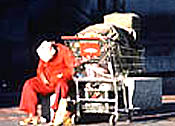|
|

|
|
|

|
 |
(JWR) --- (http://www.jewishworldreview.com)
ISRAEL MAKES its own sound.
Not the squawk of the souk hawker, the rhythms of road rage, nor TV talk show chatter. Certainly not the irretrievable tones of David's melodies.
It is the sound of Israel's past being elbowed away by Israel's present.
It all started outside my window on a quiet street in Tel Aviv. A place where neighbors call our one-block-long rehov "a little village" and are careful to point out, "We can hear the birds sing." The kind of quiet where you can hear a dog's nails as he saunters down the street.
One final swoop, a roar that sets off car alarms and a split second later, as if edited by G-d's design, total silence. Another half beat and then...jingle bells.
"Alte zachen, alte zachen." Old things, old things. Clip clop, clip clop.
Until relocating to Israel, the alte zachen's existence had somehow evaded me. The first few times I heard the horseshoe song I didn't make it in time to see this equine presence on my street, let alone understand the man's plaintive cry. Translation: Pick up your discards, what's old and broken and no longer meangingful. What I knew without question: This was a call from another era, another space.
The next sound I heard was a deliveryman bringing someone a new air conditioner. The air conditioner's hum has now replaced the sight and sound of neighbors, clad in cotton housedress and undershirt, calling out to each other, talking to spouses, supervising children from balconies. It's like "Invasion of the Body Snatchers." Out goes the neighbor, in comes the aircon pod. I haven't seen them in weeks.
At 3 AM, I'm awakened by the sound of the garbage men dragging the municipality's huge "green frog" dumpsters to the street. When the cans were small, black, manageable, stinking and overloaded, I took little notice of their movement. With this newer, bigger sound of a sanitized civilization, even the alley cats are losing sleep. I solve the problem by stuffing my ears with industrial-strength gun practice plugs.
The sound of the siren on days of memorial is the most stirring sound Israel makes. The person standing next to me at Tel Aviv's Dizengoff Center on Holocaust Memorial Day is surprised to learn that Israel is the only country in the world to honor its dead with this collective wail. This sound is really saying, "You didn't get all of us. We are still here."
Then there is Shabbat, the silence equalizer. On a Friday afternoon I'm with Zvika the Gambler. Instead of walking a half-mile, we're on his motorcycle which has the sound of a Purim grogger. During a red light he says over his shoulder, "Just listen to the sound of Shabbat in Tel Aviv. It's like poetry. This is the only unsound like it in the world."
There are sounds that waft through windows in Israel. The sound of Torah. Of song on Pesach (Passover) and Shabbat. Choir practice and oldtime community singing sessions, shira batzibor. Of men in front of TVs when their team scores a goal. Of cutlery striking plates on Rosh Hashanah. Of men striking and berating women and children, the sound of Israel's tragic, mounting statistic.
People shrug and take the alte zachen for granted. An anachronism. Lowly, not even a civil-serving garbageman. But the alte zachen is more than that. He is honoring the detritus of what this society used to be.
This is what happens to the old in Israel. Old means to be discarded or worse, ignored, not worthy of respect. A country without the sounds of deference. On buses, the elderly, the pioneers, the survivors left to stand.
I say the next time you hear him, rise for the alte zachen. Even when replaced by truck and megaphone he is a connection, a wakeup call, to the loss of our collective, hushed, humble past.
The sound of the air show was the sound of the past being sucked out of Israel. The sound of the alte zachen is the sound ofIsrael's past holding on to its
 Everything felt changed during a telephone conference cut short by a deafening barrage of sound hammering down from the skies, sending me and the cat running. I made for the balcony, then the open livingroom windows, and finally, the merpesset. Jets. Lots of them. Dress rehearsal for an air display.
Everything felt changed during a telephone conference cut short by a deafening barrage of sound hammering down from the skies, sending me and the cat running. I made for the balcony, then the open livingroom windows, and finally, the merpesset. Jets. Lots of them. Dress rehearsal for an air display.
 At about 3 PM, air conditionerless, it's too warm to work. I telephone a new friend, an elderly woman who issues this caveat: "Never call between two and five. In this country, especially if the person is retired or working at home, they're taking their afternoon nap. It's a tradition. The sound of the phone will wake them."
At about 3 PM, air conditionerless, it's too warm to work. I telephone a new friend, an elderly woman who issues this caveat: "Never call between two and five. In this country, especially if the person is retired or working at home, they're taking their afternoon nap. It's a tradition. The sound of the phone will wake them."
 There is an absence of whistling. For good reason.
There is an absence of whistling. For good reason.
JWR contributor Joan Weinberg is English-language publications editor for the Weizmann Institute and a former LA Weekly columnist. You may reach her by clicking here.
04/09/99: Confessions of a Cat Lady